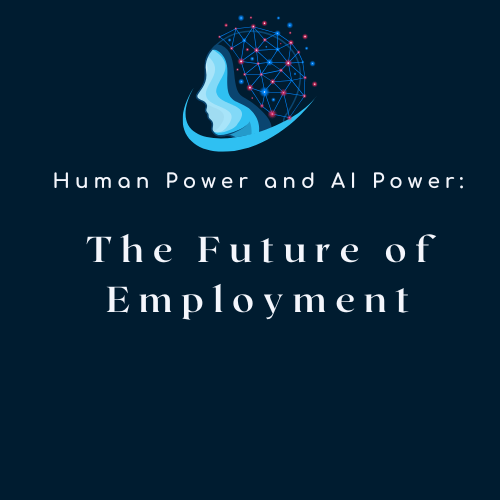The rise of Artificial Intelligence (AI) has ignited a global conversation about the future of employment. As industries rapidly adopt AI-driven technologies, the landscape of work is undergoing a transformation that challenges the traditional roles of human labour. The interplay between human power and AI power will define the future of employment, shaping how we work, what skills are valued, and what opportunities emerge.
The Human Element: Power of Creativity and Emotional Intelligence
Despite AI’s impressive capabilities, there are aspects of human power that remain irreplaceable. Human creativity, critical thinking, emotional intelligence, and ethical judgment are all crucial in areas where complex decision-making, interpersonal relationships, and innovation thrive. These qualities make us unique and enable us to contribute in ways machines cannot.
-
- Creativity and Innovation: AI can process and analyze vast amounts of data but still rely on human input for creative direction. While AI might assist in designing products or creating marketing campaigns, the spark of creativity and out-of-the-box thinking originates from human minds.
-
- Emotional Intelligence: AI can simulate conversations and respond to customer inquiries, but understanding emotions, building trust, and fostering meaningful relationships remain human strengths. Jobs that rely heavily on interpersonal connections—such as healthcare, counselling, and education—require empathy, which AI cannot fully replicate.
-
- Ethical and Critical Thinking: In industries like law, governance, and medicine, human judgment is essential for ethical decision-making. While AI may provide recommendations, humans will always have the ultimate responsibility of making morally sound choices.
AI Power: Automation, Efficiency, and Data Mastery
AI power lies in its ability to process vast amounts of information at unprecedented speeds, automate repetitive tasks, and generate data-driven insights. As AI evolves, it will increasingly complement human work by handling tasks that are tedious, time-consuming, or data-heavy.
-
- Automation of Routine Tasks: Jobs that involve repetitive tasks—such as data entry, customer support, and simple administrative work—are prime candidates for AI automation. This has raised concerns about job displacement. However, automation also opens opportunities for workers to shift their focus to more creative and strategic roles, reducing the burden of mundane tasks.
-
- Data Analysis and Insights: AI can process data faster and more accurately than any human, making it a valuable tool for industries like finance, marketing, healthcare, and supply chain management. By providing actionable insights from data, AI empowers professionals to make more informed decisions.
-
- Personalization and Efficiency: In sectors like retail, digital marketing, and entertainment, AI helps create personalized user experiences. From tailoring product recommendations to enhancing customer engagement, AI is driving efficiency and improving service delivery.
The Future of Employment: Collaboration, Not Competition
The future of work lies in the collaboration between human power and AI power. Rather than viewing AI as a threat to human jobs, the more productive approach is to see it as an opportunity for enhancement. Here’s how the future of employment might unfold:
-
- Augmentation, Not Replacement: AI is best suited to augment human capabilities, not replace them. By automating low-value tasks, AI frees up human workers to focus on high-value activities such as problem-solving, innovation, and customer interaction. In healthcare, for example, AI can analyze medical images, but doctors will still be needed to interpret results and engage with patients on a personal level.
-
- Reskilling and Upskilling: As AI continues to transform industries, workers will need to adapt by learning new skills. Embracing lifelong learning and reskilling will be critical. Governments, educational institutions, and businesses must invest in training programs to help workers transition into AI-enhanced roles. Skills in data analysis, AI programming, and human-AI collaboration will be increasingly sought after.
-
- Emerging Job Roles: The rise of AI will also create entirely new job categories. AI specialists, machine learning engineers, data scientists, and AI ethics consultants are just a few of the roles that didn’t exist a decade ago but are now in high demand. These new roles underscore the evolving nature of the job market and the potential for AI to create more employment opportunities.
-
- Human-AI Teams: In the future, we can expect to see more human-AI hybrid teams. These teams will leverage the strengths of both humans and machines, where AI handles data processing and routine tasks, and humans focus on creativity, strategy, and relationship-building. This combination will lead to greater productivity and more meaningful work experiences.
Preparing for the Future
To navigate the evolving job market, both individuals and organizations must adapt. Workers need to focus on acquiring skills that machines cannot replicate—such as creativity, emotional intelligence, and complex problem-solving—while also embracing AI tools that can enhance their efficiency.
At the same time, organizations should prioritize creating an environment where human power and AI power can coexist harmoniously. This includes fostering a culture of continuous learning, providing training for AI-related skills, and ensuring that ethical guidelines are in place to govern AI usage.
Conclusion: A Balanced Approach to Human and AI Power
The future of employment is not about choosing between human power and AI power. Instead, it’s about finding a balance where both can coexist and complement each other. While AI will undoubtedly change the way we work, it will also unlock new opportunities for humans to engage in more creative, impactful, and meaningful work. By embracing the strengths of both humans and AI, we can build a future where technology enhances human potential, rather than diminishing it.
In the future, human power and AI power will work hand in hand to shape a more productive, innovative, and collaborative workforce. The key is to prepare for this future by learning, adapting, and embracing the transformative power of AI, without losing sight of what makes us uniquely human.

Leave a Reply